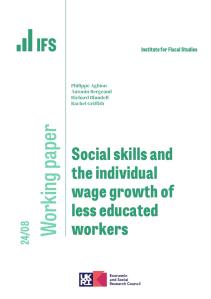ABSTRACT
Life skills play a key role in promoting educational and occupational success in early life, but their relevance at older ages is uncertain. Here we measured five life skills—conscientiousness, emotional stability, determination, control, and optimism—in 8,119 men and women aged 52 and older (mean 66.7 y). We show that the number of skills is associated with wealth, income, subjective wellbeing, less depression, low social isolation and loneliness, more close relationships, better self-rated health, fewer chronic diseases and impaired activities of daily living, faster walking speed, and favorable objective biomarkers (concentration of high-density lipoprotein cholesterol, vitamin D and C-reactive protein, and less central obesity). Life skills also predicted sustained psychological wellbeing, less loneliness, and a lower incidence of new chronic disease and physical impairment over a 4-y period. These analyses took account of age, sex, parental socioeconomic background, education, and cognitive function. No single life skill was responsible for the associations we observed, nor were they driven by factors such as socioeconomic status or health. Despite the vicissitudes of later life, life skills impact a range of outcomes, and the maintenance of these attributes may benefit the older population.
Life skills refer to a set of personal characteristics and capabilities that are thought to increase chances of success and wellbeing in life. They include persistence and determination (“grit”), conscientiousness, self-control, social skills, self-confidence, optimism, and emotional stability (1–3). They are often described as “noncognitive” to distinguish them from cognitive abilities and intellectual capacity. The term “skill” is used instead of trait in part to highlight the notion that these characteristics are malleable rather than fixed characteristics, although many life skills are partly heritable (4, 5). Various life skills have individually been found in childhood and adolescence to predict greater academic success, future employment, prosocial behavior, and health (2, 6, 7). Fostering of life skills in early life is of major interest to policy-makers in education, crime prevention, public order, employment, and health (8).
Studies of middle-aged and older people have documented associations between individual characteristics such as conscientiousness, optimism, and emotional stability and a range of social and health outcomes (9–14). However, there have been few investigations of combinations of attributes (15, 16), and little is known about the importance of the accumulation of life skills for economic, social, health, and biological outcomes in later life. We therefore investigated whether the number of skills manifest at older ages is related to a broad range of outcomes after taking childhood circumstances, education, and cognitive ability into account.








